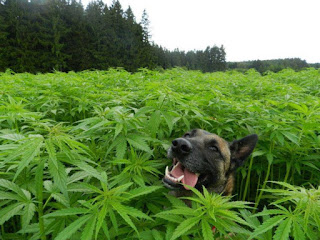"His arthritis is so much worse today!" Mrs Sorensen said, clearly upset and worried.
Although he was obviously having trouble getting up and walking, this did not look at all like arthritis symptoms.
"Have you been giving him anything for the arthritis?" I asked, a suspicion beginning to form.
"He gets his glucosamine and fish oil and then recently I started to give him a little CBD oil. Just a little doctor."
Suspicion confirmed - Ralph was stoned.
In theory this shouldn't happen with CBD, also called cannabidiol, because, in theory, it should not contain any THC, the psychoactive component of cannabis. But that's just in theory.
In one year CBD has gone from a "what's that" obscurity to an every day conversation with pet owners. Quite literally every day. I have been in practice long enough to have seen this phenomenon before. Just in recent memory vitamin E, eichinacea, grain-free diets and coconut oil have all had their moment in the sun as potential panaceas. The internet age spreads the word so much faster while amplifying the most improbable stories. In each case these remedies did not end up curing cancer, reversing kidney disease or noticeably "boosting the immune system", but each did end up finding a place in the array of options for some specific conditions in some specific patients. It's just a much smaller place than the enthusiasts had hoped for. If medicine were only so simple!
And so it will be for CBD oil. The range of disorders that people want to try it on their pets for is breathtaking, but the best evidence we have is that it might be useful for three things: epilepsy, nausea and, yes, arthritic pain. There are some problems though.
The first problem is that the research is lacking. There is a lot of work being done right now though, so hopefully we'll have some more clarity soon, but for the time being everything we know is based on anecdote and extrapolation from humans. There are plenty of examples in other areas of medicine where anecdotes and extrapolations have misled us, so some caution is warranted.
The second problem, as illustrated by Ralph's experience, is that quality control and regulation are also lacking. Contamination with THC is not that rare. I haven't seen numbers on that, but I did see another stoned dog with the same story soon after Ralph. Also, some reports indicate that the majority of commercially available CBD oil is contaminated with pesticides and other troubling substances. Google "contaminated CBD" if you're in the mood to be alarmed. Also, when tested, some of the products contain either very little or even no CBD oil at all. Moreover, all of this can vary from batch to batch, so just because Aunt Marge's corgi is like a pup again after three drops of "Doctor Good Earth's All Natural Holistic Small-Batch Artisanal CBD Oil", doesn't mean that your dog will have the same experience.
Patience people. My own dog is epileptic and I'll probably try CBD, but only once the science is in and the quality is truly assured (i.e. not just by the dude at the health food store). If your dog suffers from epilepsy, chronic nausea or arthritic pain and you feel like you can't be patient because nothing else has worked, please check with your vet first before winging it with CBD. New information is coming out regularly.
Ralph was better after about a day. Mrs Sorensen is going to be patient now.

No comments:
Post a Comment